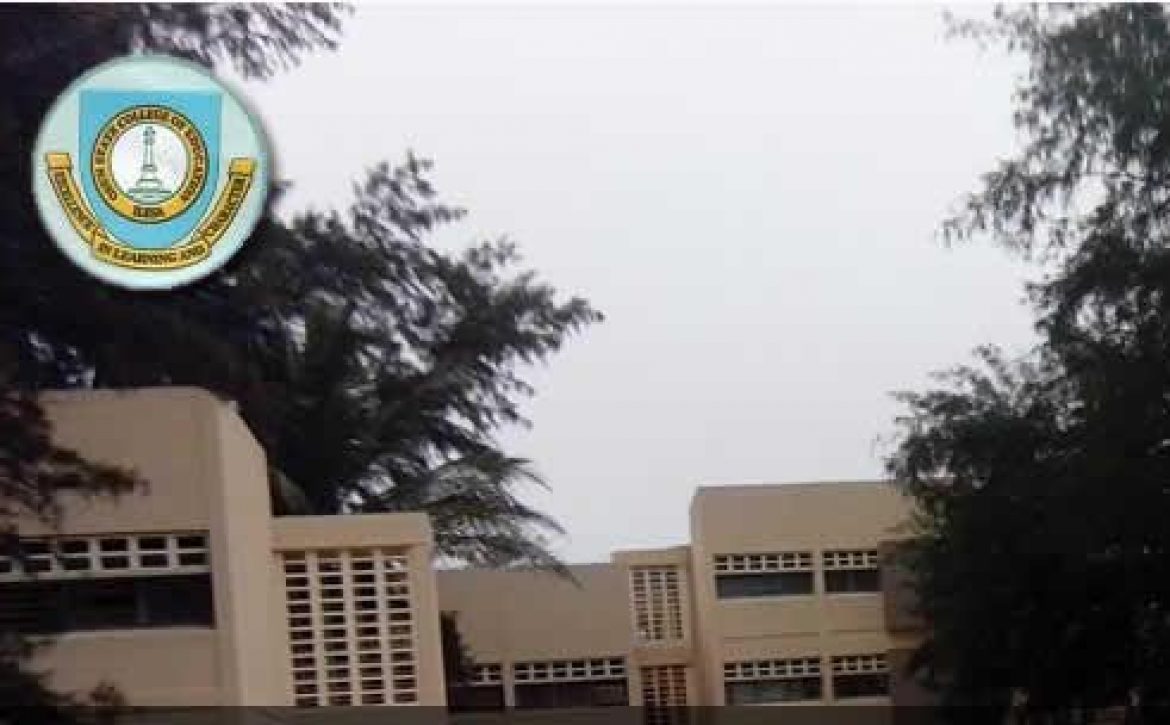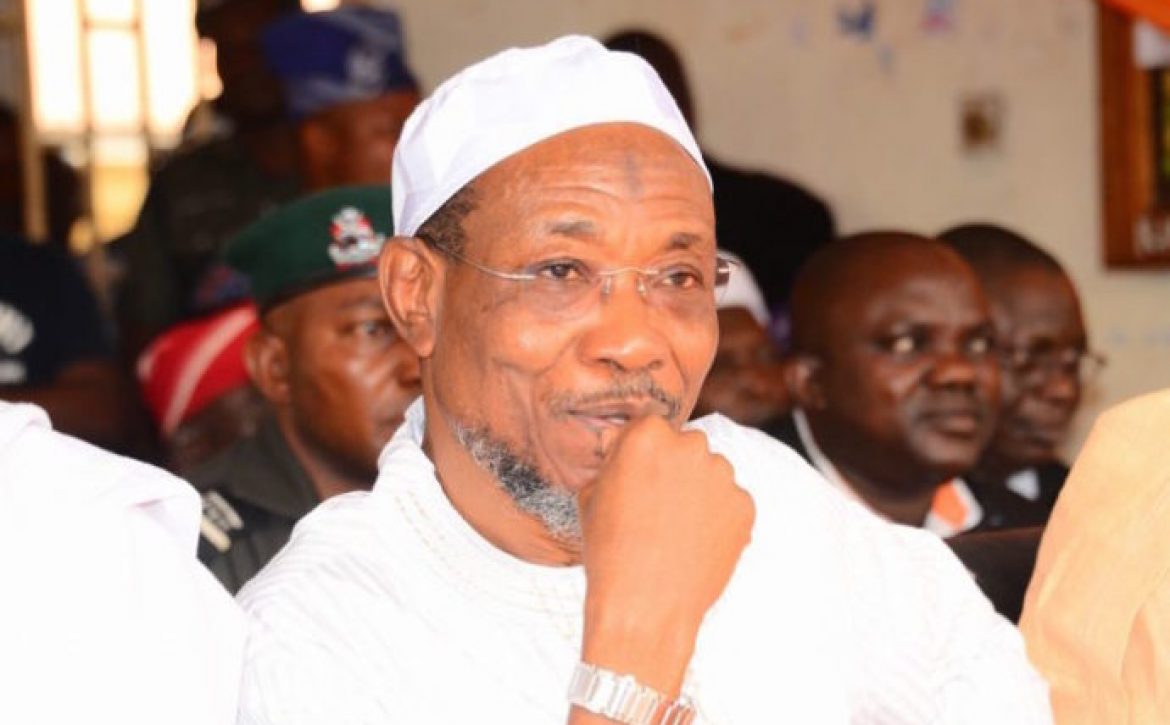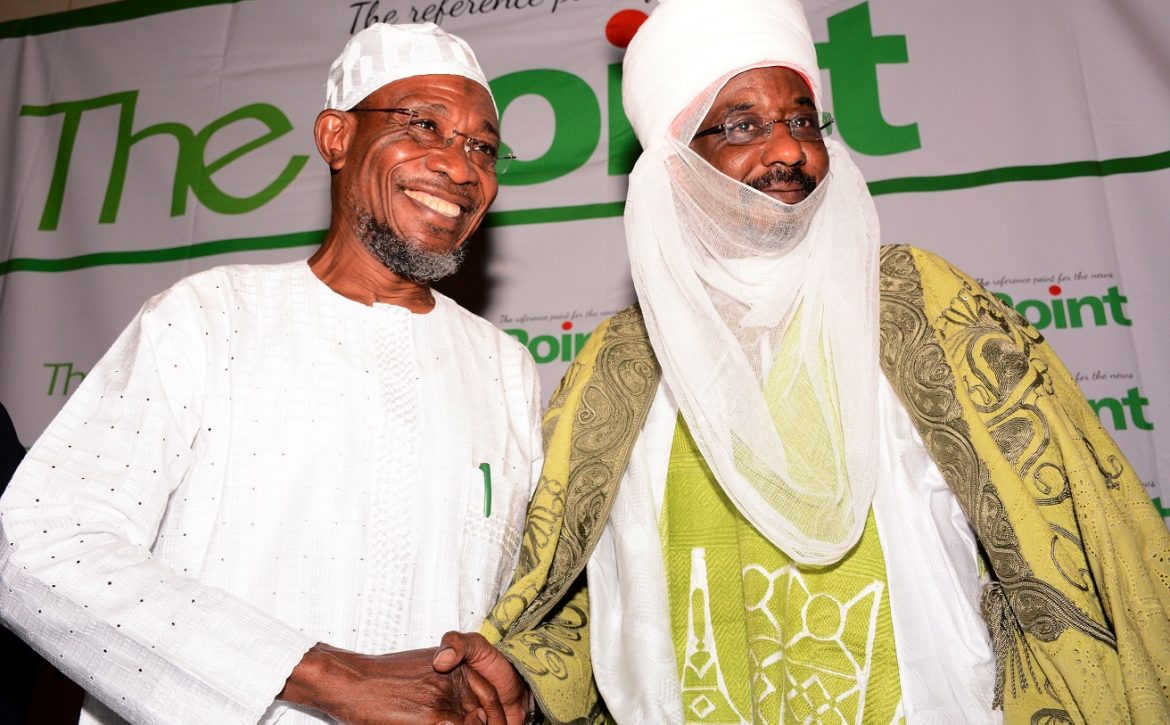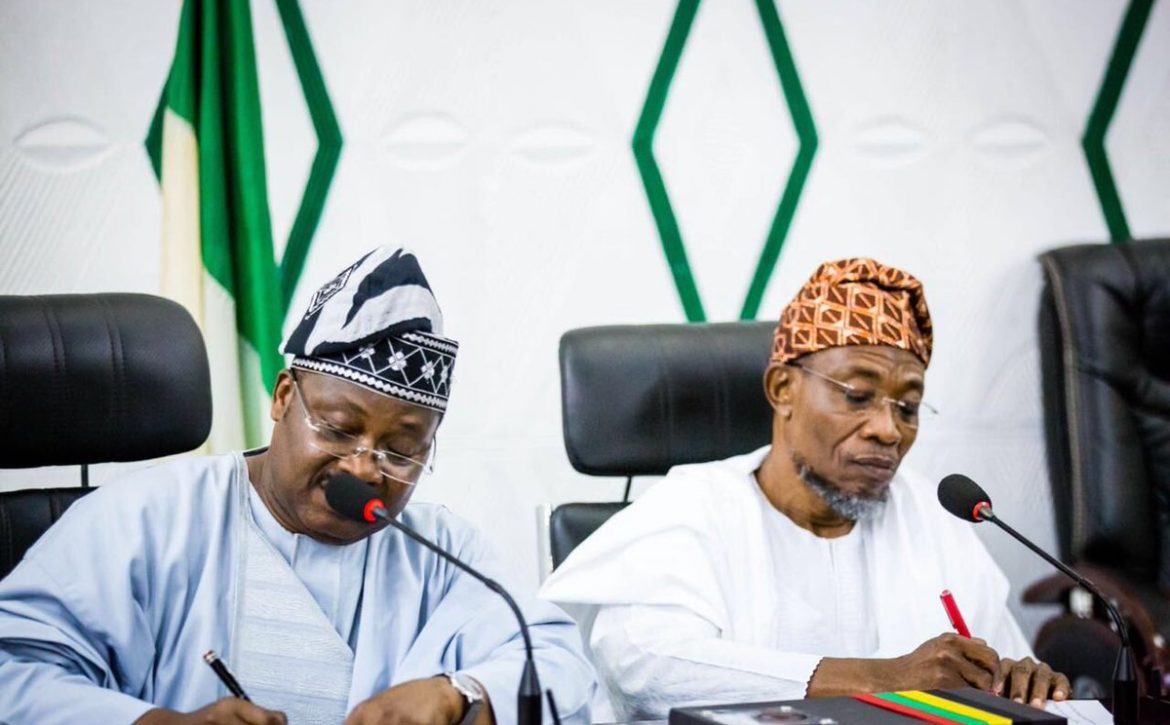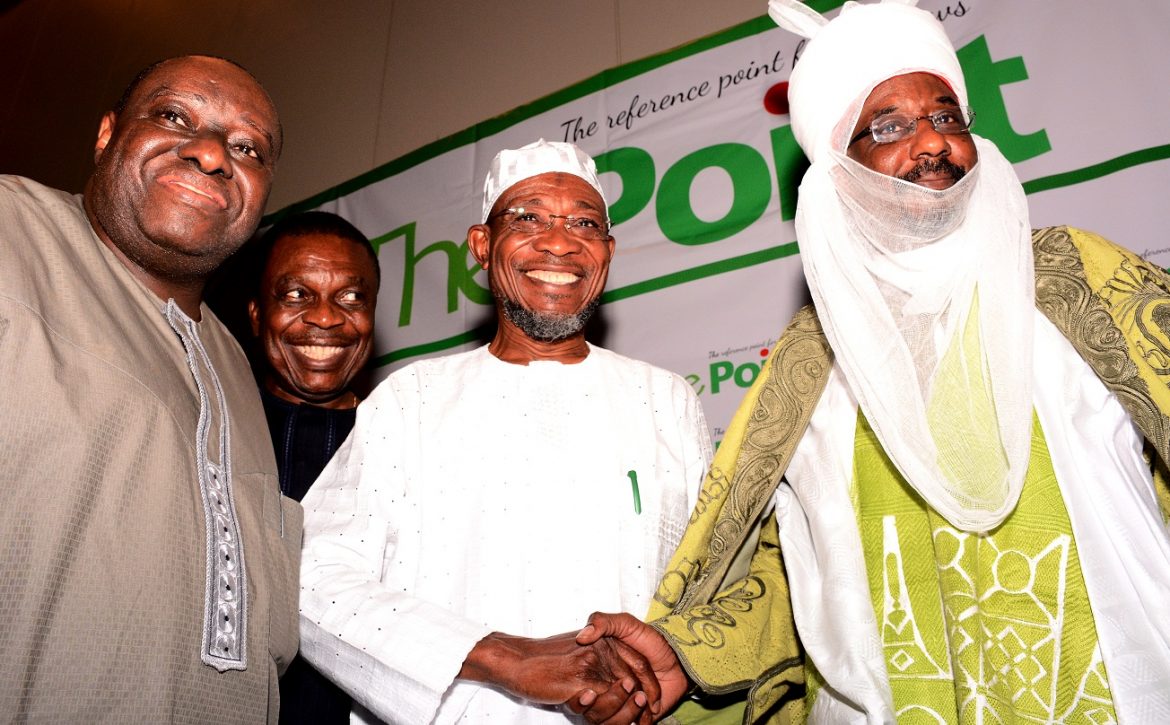Every care giver in the state should strive to impact positively on the beneficiaries and the people so that the service being rendered will be meaningful and rewarding .
The Permanent Secretary, Ministry of Women, Children and Social Affairs, Pharmacist (Mrs) Omolara Ajayi made this known at an in-house Capacity Building workshop held at the Children’s Home and Correctional Centre, OSOGBO for care givers and social workers in the state.
Pharmacist (Mrs) Ajayi affirmed that the children, who are the beneficiaries of the care giving and service , have the right to survive no matter the economic condition of their parents and the society.
She then enjoined the care givers to embrace learning so that they can improve on their performance and development.
She also called on the caregivers to be steadfast in taking care of the children at the Home and Correctional Centre. According to her, “if you have knowledge and keep it to yourself, the knowledge will die with you and won’t be useful to anyone “.
Also speaking, the Zonal Welfare Officer, Ede, Mrs. A . Lawrence, in her presentation, affirmed that the challenges of children at the Home and Correctional Centres are enormous, yet, self-expectation, fulfilment and actualization are keys to overcoming such challenges.
She maintained that care givers and social workers must be prudent, have motion all balance and intelligence and must be emphatic without giving room to bullying ,aggression or anger to the children no matter the circumstance.
The Government of the Sate of Osun has called on residents and all professional associations in the State to give necessary support to the internally Generated Revenue (IGR) drive embarked upon by the present administration in the State, describing the revenue move as the only saving alternative for government to meet up with its statutory responsibility of making life more easy for the entire citizens .

The Coordinating Director for the State of Osun Ministry of Agriculture,Food Security and Youth Engagement, Dr Oluwabulola Aluko made the call while presenting Seven Hundred and Fifty Four Thousand Naira (#754,000) cheque off dues to Osun State Executives of the National Union of Butchers(NUB) during an interactive meeting held at the Conference Hall Of the Ministry of Agriculture,Food Security and Youth Engagement.
Dr Aluko disclosed that citizens also have the right to inform the state government of any loophole that opens to them in order for government to meet up with its revenue target. He noted that any tax evader at this crucial time that the oil price is dwindling at the international market and when Federal monthly allocation is totally unreliable is an enemy of the State
He maintained that the Seven hundred and fifty four thousand Naira(#754,00) cheque presented to the Butchers Union is a proving evidence that Governor Rauf Adesoji Aregbesola is a promise keeper and a goal getter,who strives for the development of the State without trampling on the right of his people.
The Coordinating Director recalled that the collection of #700 and #500 on each slaughtered cow and goat respectively began in August this year with a sharing agreement of ratio 1 to 6 between the government and the Butcher Union to boost the internally generated revenue in the State.
He used the period of the meeting to advise the butchers executive to concretize the existing relationship between their association and Osun government by making judicious use of any dues accruing to the association account for the benefit of all members and also ensure that their members pay all necessary government levies and taxes as
and when due.
While promising that the veterinary and other monitoring field officers would continue to perform their official responsibility diligently by constantly monitoring the butchers activities in the State,he prayed for the quick realization of modern abattoir planned to be constructed by the present administration .
Also speaking,”Are Alapata” in the State of Osun ,Alhaji Jabaru Tiamiyu and the State chairman butchers Union in Osun,Alhaji Sulaiman Adebimpe, who received the cheque on behalf of their members appreciate the government support and efforts at ensuring that there is unity and cooperation within the butcher association.
The duo promised that they will try all their efforts to improve the expected IGR on slaughtered animals across the state through strict monitoring of all slaughtered slabs.
They therefore appealed to the government to consider more of their members in the supply of beef for the o-meals school feeding programme.
The Government of Osun on Tuesday declared the Osun State College of Education, Ila-Orangun, opened for academic activities with immediate effect.
In line with its policy of re-engineering its tertiary institutions, government had set up visitation panels to the Osun State Colleges of Education at Ilesa and Ila-Orangun, Osun State Polytechnic Iree and Osun State College of Technology Esa-Oke.

The government, in a statement by the Permanent Secretary, Osun Ministry of Education, Science and Technology, Sunday Olajide, said members of the visitation panels are men of proven integrity who had worked and acquired experiences over the years in various tertiary institutions.
The permanent secretary noted that in government’s bid to restore discipline and morality at the institutions, personnel audit exercises were carried out by the authorities of the four tertiary institutions.
The statement held that the reports of the visitation panels and the personnel audit teams submitted to government were thoroughly examined with particular reference to the various recommendations of the panels.
Mr. Olajide said, “The recommendations of the Visitation Panels and Personnel Audit team were reviewed by Government and passed to the Governing Council of each of the tertiary institutions for implementation.
“At the point of implementation, the Labour Unions of the tertiary institutions complained of bitterness, animosity and deviation in the implementation of the reports.
“Mr. Governor in his wisdom, forwarded the complaints/issues raised by the unions to the State House of Assembly and Some concerned and revered citizens in the State for consideration in the overall interest of the State.
“Thereafter, Mr. Governor held a joint meeting with Members of the House of Assembly Committee on Education, Chairmen of the Governing Councils of the institutions and the concerned and revered citizens.
The statement further explained that at the meeting, collective decisions were taken in the interest of the state based on the reports of the visitation panels, personnel audit teams and findings of the House of Assembly committee on education and the concerned and revered citizens.
It added, “The joint decisions identified and listed names of staff who are to be disengaged from the services of the tertiary institutions and names of those staff who are to receive letters of warning.
“Copies of the report which contains details of the decisions taken and ratified by Mr. Governor, Ogbeni Rauf Adesoji Aregbesola, have been forwarded to the Governing Council of each tertiary institution for implementation with immediate effect”.
The permanent secretary, however, appealed to all staff, students, communities, governing councils of the four institutions and the general public to cooperate with government to make the institutions peaceful for learning, teaching and research.
He added that the government “is determined to maintain law and order. All citizens are enjoined to go about their lawful activities as no act of lawlessness by any individual or group will be condoned in any of the affected four tertiary institutions.”
Fresh information emanating from the West Africa Examination Council (WAEC) has shown a 113% improvement in the performance of students who wrote the May/June West African Senior School Certificate Examination (WASSCE) in Osun state. The analysis of 10 years WASSCE results as seen in the table below, shows the increased dividends from the massive investments in education by the administration of Ogbeni Rauf Aregbesola.

Results seen in the analysis of Osun students who passed with 5+ credits including English and Mathematics, shows a poor record of 6.86% of the total number of candidates who sat for the exams in 2007, long before the advent of Ogbeni Rauf Aregbesola in the state.
Most critics failed to analyse Osun’s historical performance when comparing the performance of students across states in Nigeria.
The laid-back analysis of comparing state by state performance by many is faulty, in that, if a state presents only 10,000 candidates for the WASSCE, and 7,500 students are able to secure 5 credits including mathematics and English, then such state with a pass percentage of 75%, would be placed above a state who presents 100,000 candidates with a 50% pass percentage.
As much as this analysis could be theoretically correct, it fails to put into consideration, peculiarities of individual states.”
Consider the State of Osun for example, analysis of WASSCE result over a 10-year period shows considerable improvement in the performance of students, reaching a climax of 46.3% in 2016, despite taking 29th position in the entire country.”
“While this achievement may appear insignificant at face value, however, compared to the year 2007 when a woeful 6.86% pass performance was recorded, it attests to the considerable interventions the state government has made to tackle education head-on.”
He said that “Since the Ogbeni administration took over governance in November 2010, students’ WAEC performance has gradually improved as seen in the infographics below.”
“Specifically, the 2016 WASSCE result (46.3%% pass rate) shows an improvement of 113.56% over a space of one year when compared with the 2015 result (21.68% pass rate). We can go on and on calculating how year in, year out, the Aregbesola administration has embarked on painstaking steps to not only address the relative decline and stagnation in students’ educational performance but recorded considerable improvement accordingly.”
“While skeptics and cynics sat back and dismissed the Ogbeni’s administration as it committed considerable steps to arrest the over 30 year rot in education, they failed to realize that, the future of our youth is non-negotiable as such considerable positive change of this magnitude requires systematic effort, determinism and perseverance which is often a slow and gradual process.”
“For those without a sense of history, need I recall that the Ogbeni Rauf Aregbesola inherited a comatose education sector, where teachers lacked motivation, students were less interested in learning, and school buildings resembled chicken pens rather than institutions of learning.”
However, a quick run across the state shows considerable improvement from the past administrations in an effort to avoid failing too many of our children by sending them out into what we hope to become a 21st century economy through the doors of 20th century schools.
New palatial learning buildings now dot the Osun landscape – One was recently commissioned by President Muhammudu Buhari on Thursday, 1 st of September, 2016. Osun teachers are well paid and equipped – 5,000 of them has been trained and retrained so far, and students more than ever before, are taking vast opportunities before them.
The Opon-Imo tablet still works wonders amongst students who possess them. Opon-Imo, an indigenous Technology Enhanced Learning Platform (TELP) with locally produced content is designed for the Nigerian secondary education system. It is preloaded with lesson notes on seventeen (17) subjects offered by students writing the West African Senior School Certificate Examinations (WASSCE) and NECO SSCE.
Also preloaded inside the Opon-Imo tablet is over 40,000 past examination questions spanning a period of ten years, for (private) practice, 63 etextbooks covering 17 subjects’ areas that students do register for in external examinations and 51 audio tutorials installed as study aid.
Opon-Imo is also preloaded with seven extra-curricular subjects such as Sexuality Education, Civic Education, Yoruba History, Ifa Traditional Religion, Computer Education and Entrepreneurship Education, and Twelve Thousand Yoruba Proverbs.
These and many more are the initiatives and measures the Ogbeni Rauf Aregbesola has set in place to concisely improve the state of education for the future of our kids and consequently nation. The basic premise is that the status quo of dilapidated structures, ill-equipped teachers, limited exposure of our kids to the very tools driving 21st century economies must be tackled comprehensively.
The future of our kids, development of our economy and building of a nation through education is a promise the Ogbeni administration seeks to guard jealously and deliver.
Osun may not be in the desired place amongst comity of states in WASSCE performance, but we are making considerable strides as we deliver our promise to the people, and Ogbeni’s investment in education is paying off.
Gov. Rauf Aregbesola of Osun has solicited the passage of the State Universal Basic Education Board (SUBEB) Establishment Bill by the House of Assembly.

This is contained in a letter written by the governor to the assembly and read by the Speaker, Mr Najeem Salaam, during plenary on Wednesday.
Aregbesola, in the letter, also sought for the passage of the Local Government Education Authority Bill.
The governor also urged the lawmakers to screen Mr Asaola Adebowale as Commissioner 1 in the Civil Service Commission to replace the late Robert Adebiyi.
The two bills, according to the speaker, would provide for effective regulation and management of elementary and middle schools in the state.
A motion for the first reading of the bills was subsequently moved by the Majority Leader of the house, Mr Timothy Owoeye, and seconded by the Chief Whip, Folorunsho Bamisayemi.
Salaam, however, urged members to study the bill properly to enable them to make meaningful contributions during debate.
In his speech titled: “Breaking the cycle of dependence” at the public presentation of The Point and the newspaper’s first annual independence lecture on the economy, organised by Right Dev Limited in Lagos, Osun State Governor Rauf Aregbesola traces the prevailing economic crisis to the early 80s. He prescribes the pills for remedial treatment temporary and enduring cure.

Our subject of discussion is actually a question – “What is the economics of change?” This is a play on word that indirectly puts to task the campaign mantra of our party – the All Progressives Congress (APC) – that promised Nigerians a change for the better during last year’s election campaign. It is being subtly challenged in light of the declaration by the minders of the Nigerian economy that it has lapsed into recession.
This is on the heels of steep inflation and rising cost of all items; the continued fall in the value of the naira against other currencies; retrenchment of workers in the private sector and the challenges faced by 27 states of the federation in paying workers’ salaries.
There has also been an unusual interest of the media to report pathetic human angle stories of domestic violence, divorce, suicide and petty theft, all blamed on the economic situation in the country. A man that battered his wife to death; a civil servant that reportedly stole his neighbour’s pot of soup; a woman that chopped off her husband’s manhood; and depressed individuals that took their own lives, are regular and prominent daily news items, all blamed directly on the recession.
So, the question is rhetorical because it is cast in a self-evident form with the answer so obvious and tellingly screaming “No, this is not change, or, at least, not the change we asked for”.
Genesis of economic woes
But quite honestly, while we may not deny the obvious, these developments do not actually reflect the whole truth. The freefall of the Nigerian economy had begun long before the coming to power of the APC. It has come to the nadir now and we can only be thankful that it is not worse than it actually is, because, indeed, it could have been worse.
The fundamental problem is that we can no longer fund our imports because our foreign earnings have progressively declined while our taste for, and dependence on foreign goods have continued to increase. This is what puts pressure on the naira, makes imported goods to become very expensive and the economy in a tailspin.
Let me add at this point that this recession is not new. It is a cycle that we have experienced several times in the past. We had one in the post crude oil dependency era, circa 1981-82, when Chief Obafemi Awolowo warned that the ship of state was headed for the rocks. He was dubbed then as ‘prophet of doom’ by the ruling National Party of Nigeria (NPN). His prognosis was simple. At the time, just like now, the price of oil fell. By 1983, we could hardly finance our imports and many states were distressed. The reaction then, as it is now, was to blame it on the profligacy of state governors, forgetting that revenue is recurrent – you only spend what you have and profligacy will no longer be possible when the tap runs dry since you cannot spend what you don’t have.
Oil price fall a recurring decimal
Again, oil price fell under the Gen. Sani Abacha regime, bringing economic downturns and stress to the states. We had this again during the brief spell of Gen Abdulsalam Abubakar. The difference then was that salaries and emoluments of workers were a reasonable fraction of expenditure and the military government of the time was not under any obligation of development. The military was more like an occupation force whose primary responsibility was to maintain law and order and keep the peace.
Former President Olusegun Obasanjo’s administration also had the same problem twice while his successor, Umaru Yar’Adua, also had a depression on account of falling oil price.
The difference with these previous situations was that they never lasted. However, this is the first time that there will be a decline in oil price which has been sustained for more than two years running. Sooner or later, it is bound to knock the bottom off any economy. Hence, the need for urgent action for recovery.
Don’t let us kid ourselves; we are dependent on imports, for everything. We import food, automobiles, petroleum products, drugs, clothing, building materials, machineries, electronics, cosmetics and household products.
You are aware that up to the middle of 2013, crude oil was selling well above $120. The federation account disbursed in excess of N1 trillion every month and our foreign reserves was rising. At a point in 2008, it stood at $62 billion. We were not saving, or better put, we were not using these huge earnings to develop our economy. According to the Central Bank of Nigeria (CBN), the Federal Government funded the operations of Bureau de Change (BDC) for 11 years with $66 billion before it was stopped in January this year. During this period, Nigerians were encouraged to obtain credit or debit card with which to shop abroad or buy goods online.
Our foreign earnings have since dropped because of the fall in oil price. Late last year, and early this year, oil sold for as low as $22 before hovering now around $50. But we have double whammy in that not only has the price dropped; our daily production has fallen as well. From all accounts, we are losing not less than one million barrels of crude oil per day, out of our 2.3 million official allocation, due to sabotage by militants in the Niger Delta.
In the absence of other serious foreign exchange earners, we are bound to have problems financing our imports, which are huge and humongous. Just take a sample:
At official level, according to the Nigerian National Petroleum Corporation (NNPC), we spend $20 million daily or $1.8 billion quarterly which translates to $7.2 billion annually to import fuel. We also spend $20 billion every year to import food. This will include $700 million on fish. There are conflicting figures but the highest, from a former minister of commerce and industry, Charles Ugwu, an engineer, claims that we spend $2.6 billion annually to import rice while the CBN claims that our rice import bill for three years cost $2.4 billion. It will also include wheat, biscuits, noodles, dairy products, pastas, wines and other food items.
By importing, we are simply developing the economies of the nations that we buy from, through job creation, value chain maintenance, capacity for product development and other spinoff effects of production.
Local manufacturing as elixir
You can imagine that there are seven million vehicles on our roads and we do not produce a single tyre for them. If the average lifespan of a tyre is three years, then every three years, we need 28 million tyres, working on the assumption that an average car has four wheels. We must then find a way to import 28 million new or used tyres. We can imagine what effect it would have on our economy if we produce just half of these tyres at home.
Then of course, we import textiles and clothing items, including handkerchiefs, underwear and footwear to the tune of $4 billion in a year. Apart from traditional wears, virtually all formal wears are now imported. For a very long time now, I have stopped wearing non-traditional dresses. If half of the country had been like me, it means that at least 80 million people will engage our local tailors and retain that whole transaction within our economy.
This problem did not begin last year. It has been the orientation of our economy since the oil boom of the 1970s. It must therefore be sensitive to the shocks of oil price crash.
Remidial treatment
What we can do in the short-term is to find alternative sources of funding for our balance of trade deficit through borrowing, restriction on the importation of non-essential goods for which we can readily find local alternatives and disposing off idle and non-performing assets. We should also, by whatever means, end the conflict in the Niger Delta to be able to ramp up oil production. Adding one million barrels to our production will take us out of the woods. Therefore, plugging leakages and recovering loot, as the government is doing, is a right step to stop the hemorrhaging of the economy and maximising the current situation.
Another short-term solution is to, in the Keynesian mode, engage in direct employment of youths. In spite of neoliberal opposition, this policy has never failed in addressing depression in the past. This is one of the innovations we brought to governance. Our administration has carried out the engagement of two tranches of 20,000 youths in public works in quick succession. The OYES cadets were not given permanent employment but engaged as volunteers and given monthly allowance. They were eventually given soft landing in the various empowerment schemes of the government in agriculture, teaching and Information and Communication Technology (ICT). In less than two years of taking the youths off the streets, crime rate in Osun dropped to rock bottom. It also reflated the local economy since the N200 million monthly allowances given to them percolated into the grassroots. It is public fund well spent. The programme has since been adopted by the World Bank and introduced nationally in a modified form as YESSO.
Permanent solution
The long-term solution is to get off the addiction to imported goods and start producing what we consume. We have no business importing fuel, for instance. We should be producing refined fuel, not just for local consumption, but for export as well. There should be a national policy centred on local refining of our crude. It will not only reduce the price of fuel, it will create jobs, wealth, foster a value-chain and bring development.
Back to farm
We should also cut the importation of food to less than 25 per cent of the current volume. This is to enable us develop agriculture. It has been the policy of our administration since day one to promote food production in order to be able to feed our people. It is really shameful that in spite of our endowments in natural resources, we are still dependent on imported food items as a nation.
We should return to farming, not just at the subsistent level, but as big business. We should strive to increase agriculture productivity and yield. While Nigeria is the leading producer of cassava for instance, the traditional yield per hectare has been around 10 tonnes, while global average in 2010 put at 12.5 tonnes.
However, India’s average yield in 2010 was 34.8 tonnes per hectares and Thailand’s yield is reported to be a whopping 120 tonnes per hectare.
If we can double our food output from cultivating the same land size as we currently do, it is possible to eliminate hunger from the country. But this will require innovation in crop science, agriculture mechanisation, extension services, improved inputs and agriculture entrepreneurship. The agriculture knowledge base has to be widened and scientific findings have to be brought to (and applied by) the farmers.
There must also be a transition from producer of primary goods to value adding. Adding values create a value chain that increases the momentum of development. For instance, the value of one kilogramme of cocoa beans that we export is multiplied 5,000 times by the time we import it as chocolate. If we can make the same quality of chocolate, we could have earned 5,000 times the value we derive from cocoa beans in a value chain that includes revenue generation, wealth creation, job creation and spiralling effect of developing ancillary industries around this product.
Functional education
not negotiable
The primary engine of development is education. This is where innovation is most needed. A functional system of education that develops and put to use the creativity of Nigerians is urgently needed.
I conceive of education as the preparation and development of worthy citizens for the immediate society and the world at large. Education is that infrastructure of the mind that develops our youths to become models of good character, innovation and competence. This is what we call Omoluabi in Yoruba.
Omoluabi is the epitome of virtue. An Omoluabi personae is honest, courageous and rational; one who excels in character, innovation and competence. The educated person is well connected to his or her culture and heritage. Everything he/she does with others, the society, family and friends is driven by the desire to live and demonstrate good deeds. It is only when we interrogate this definition that we can know if we are meeting the objectives of education.
Making graduates employable
Education has not been an engine of development. Rather, it is a system of social stratification where bland certificates are issued in order to separate the political and economic elites from the others. This is one of the factors responsible for poor productivity. Those who have certificates without the requisite skills cannot drive enterprise or provide leadership. They only see their certification as entitlement to privileges.
It is always embarrassing to hear employers say our graduates are not employable. The bright ones among them have to be trained and retrained to be found suitable for the jobs on hand.
Education therefore has received the greatest attention and resources from our administration. One of our first tasks was to convene an education summit, headed by the Nobel Laureate, Prof Wole Soyinka. That summit produced the blueprint of our education reforms. In a state of roughly four million people, we embarked on an ambitious programme of building from the scratch 100 elementary schools, 50 middle schools and 20 high schools. Each of these schools has capacity for 1000 pupils, with the high school being a three in one, each designed and equipped to sustain 3000 pupils. These new public schools soon began to displace private schools.
We provided a stand-alone e-learning tablet, which we named ‘Opon Imo’ (tablet of knowledge), for final year students in public schools, in share display of creativity. This tablet contains all the recommended 56 textbooks by the three examination bodies for senior school certificate examinations in Nigeria. It contains also past questions of these bodies, a virtual classroom, extracurricular zone and the themes of Yoruba traditional religion. This tablet was the saving grace in a year when teachers went on strike for eight months and did not prepare the final year students for their examinations.
We also pioneered in a sense, the home grown school feeding programme (O’MEALS), in which sumptuous meals are provided for 252,000 elementary school pupils on every school day. We say ‘in a sense’ because the programme had existed in an attenuated form prior to our coming, but our administration gave it a new identity and prominence.
Because of its success in Osun, it has now been nationally adopted by the Federal Government. Very recently, our state organised a national induction for other states understudying the programme, preparatory to implementing it in their own states. I have also been invited twice to the British Parliament to share our experience with the world.
The interesting aspect of this programme, as it relates with innovation, is that it is integrated with our agriculture policy and local empowerment. Under it, 3000 community-based caterers were employed, trained and assisted financially to set up their business of community catering.
Also, to be able to feed these pupils, 15,000 whole chickens, 254,000 eggs, 35 heads of cattle and 40 tonnes of catfish are purchased weekly from farmers and food vendors. This has kept the farmers in profitable business and even attracted other youths to farming.
In keeping with the original objective of making the programme home grown, the O’MEALS has an input supply chain that is linked to our various agricultural development projects. Consequently, our Osun Fisheries Out-growers Production Scheme (OFOPS) provides the catfish used for the school feeding programme while Osun Broilers Out-growers Programme (OBOPS) provides part of the chickens.
We also need a national policy on entrepreneurship development. The most successful and leading enterprises in the country are owned largely by foreigners, with our people being minority shareholders. A system where it is easier to prosper and succeed in business through buying and selling is inherently anti-development. Entrepreneurship training should be part of education at all levels.
In all, we should change the direction of our economy from dependency to self-sufficiency. It will take sacrifice, hard work, determination and unrelenting pursuit.
If we fail to do this, we should be preparing for another recession when next there is a fall in oil price.
Once again, I thank Right Dev Limited for the invitation to be here and I wish your new born baby a successful entrance into the media world.
Industrialists in the State of Osun have been urged to produce to standard to make their products globally competitive.
This was stated by the Coordinating Director of Ministry of Industries, Commerce, Cooperatives and Empowerment, Mr. Abimbola Oso during a-day Industrial Business Clinic organised by the Ministry.
During his opening remarks, Mr. Abimbola said the main objective of the clinic was to discuss the challenges which industrialists in the state are facing and proffer necessary action plan to mitigate the challenges.
He reiterated the readiness of the State Government, under the leadership of the State Governor, Ogbeni Rauf Aregbesola to decisively address problems confronting industrialists in the state with a view to solving them and placing the state on the path of sustainable industrial development
Mr. Abimbola later advised the Industrialists to regularly intimate the Ministry of the challenges affecting the smooth operation of their businesses.
Speaking in the same vein, Mr. Badewole from the Standard Organization of Nigeria (SON) urged the participants present at the clinic to put into practice everything they had been told to ensure that the industrial sectors are performing well.
Industrialists at the clinic expressed their gratitude to the Ministry and the State Government for organising the programme. They called for Government patronage of their products and putting in place a fiscal and monetary measures that will enhance their operation.
Present at the event were the former Commissioner for Commerce, Mr. Jayeoba Alagbada, other Directors of the Ministry as well as heads of Federal Government Industrial Regulatory Agencies.
The State of Osun Judiciary under the leadership of the State Chief Judge, Hon. Justice Oyebola Adepele yesterday (Tuesday 25th of October, 2016) held a Valedictory Court Session and Send-forth Ceremony in honour of a retiring judge, Hon. Justice Adebisi Oyedele Ogunlade at High Court No 1, High Court of Justice, Ilobu Road, Osogbo
This was contained in a statement by the Chief Registrar of the State High Court, Mr. Lawrence Olawale Arojo.
Osun State House of Assembly under the leaders of its Speaker, Honourable Najeem Salaam has lauded the Governors of Osun and Oyo states, Rauf Aregbesola and Abiola Ajimobi for the peaceful resolution on the recent controversy about ownership and management of the Ladoke Akintola University of Technology.

In a statement by the Chairman, House Committee on Information and Strategy, Hon. Olatunbosun Oyintiloye, the Assembly said, the gesture of the two leaders had demonstrated that they are living up to the demand of their offices.
The assembly noted that conflicts cannot be ruled out in any human settings even among siblings but allowing conflict to degenerate into crisis was a responsibility that leadership must exercise.
This resolution according to the assembly would make the institution stronger and meet up with the aspiration of its founding fathers.
According to Assembly, the resolution and the re-affirmation of the joint ownership of the institution by the two states has vindicated that path of peace, dialogue and tolerance was the way to go rather than any party fanning the ember of discord and violence.
“We have always said that Oyo and Osun, are creations of law and the constitution and would not do anything that would contravene the same constitution over the joint ownership of LAUTECH.
“LAUTECH is also created by law and unless that law is jointly amended by the two states, none of the two states can arrogate to herself the sole ownership of the institution.
“Those fanning the ember of discord needed to be educated on this and desist from causing disharmony between the two states and their people over the institution.
“It was a privilege that the institution is located in Ogbomosho, Oyo State and that privilege must be properly explored by the hosting community for economic development”, it said.
The Assembly then charged the government of the two states to design ways of making the institution self-sustaining like other universities.
It said, by making such design, it would relief the two states, the burden of using their scarce revenue to finance the institution on monthly basis, rather than making it a revenue-generating institution on its own.
The parliament further noted that LAUTECH has created for itself a name that would continue to place it in the lead among its peers, saying, the advantage must be properly made use of.
It said, the management of the institution must strive very hard to maintain the lead that the university has secured.
Osun Assembly also expressed the need for the two Houses to work together on matters of mutual interest rather than be seen as groups working at cross purposes.
It then appealed to the workers who have been on strike since the commencement of the ownership crisis of the institution to return to work in the interest of the students host community and the people of the two states.
Governor Rauf Aregbesola of Osun State has listed ways for Nigeria to quickly get out of the current economic recession.

Aregbesola spoke weekend during the one-year anniversary and first annual lecture of The Point Newspapers held at the Eko Hotel, Lagos. At the lecture with the theme, The Economics of Change, the governor said Nigeria must cut its dependence on foreign goods, increase local production and enhance entrepreneurship, adding these would help save the local currency which currently carries too much pressure.
Aregbesola expressed regrets that Nigeria has failed to make use of the huge opportunities in agriculture and manufacturing sectors. Also at the event, among other prominent personalities, were the Emir of Kano, Muhammadu Sanusi and Alake of Egbaland, Oba Adedotun Aremu Gbadebo.
The governor said it was disheartening that Nigeria depends too much on foreign foods, which is killing agriculture. He said: “We should also cut the importation of food to less than 25 per cent of the current volume. This is to enable us develop agriculture.
It has been the policy of our administration since day one to promote food production in order to be able to feed our people.”



